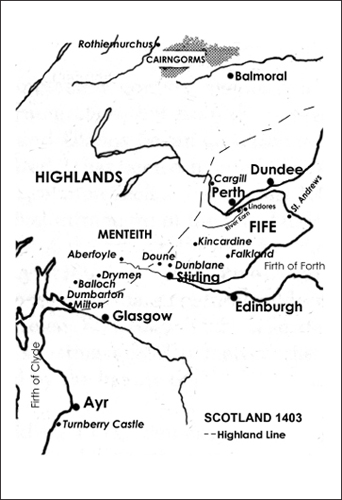Highland Lover: Book 3 Scottish Knights Trilogy
Read Highland Lover: Book 3 Scottish Knights Trilogy Online
Authors: Amanda Scott



A Preview of
The Laird’s Choice
To Debi Allen, Jody Allen, Rosemary Murray &
the many other readers who have become members
of the Aid Amanda’s Research Society,
I thank you all most sincerely!


F
or the reader’s convenience, the author offers the following guide:
Ciara = SHAR-a
Clachan = village
Fain = eager
Forbye = besides, furthermore, however
Gangplank = the board or ramp that provides access from dock to galley
Gangway = the walkway between the rows of oarsmen’s benches on a Highland galley, birlinn (a large galley designed to carry cargo), or a hybrid
Ivor = EE-ver
Owf = not crazy but “off,” not normal
Rothesay = ROSS-y
Shoogle = roil, shake up
Strath = valley, usually a river valley
… the noo = now

Falkland Castle, Scotland, 27 March 1402
T
he man she saw lying awkwardly on the dirt floor was unnaturally thin, little more than skin and bones. Even so, she could sense his pain. She sensed, too, that his parched, dry skin felt too tight for his body. His once silky, fair, shoulder-length hair was straw stiff and dull from grime and lack of nutrients.
He lay curled on one side, as if he had sought to return to his mother’s womb or felt pain in his stomach. One thin arm stretched outward, palm open, to catch cornmeal drifting down on pale beams of light that slipped through narrow spaces between planks of the mill floor high above him. The meal looked like ordinary dust motes dancing in ordinary moonbeams.
Since her view of the scene seemed to emerge from a surrounding black cloud, she was unsure of how she knew about the mill. But she was certain of its presence and certain that the drifting motes were cornmeal, not dust.
Even as that thought passed through her mind, she recognized a stronger perception that could not be hers and must be the man’s own vague awareness of meal
in his open palm that he lacked strength to bring to his mouth.
His frustration seemed to add force to his thoughts, making them easier for her to discern. He was as good as telling her that he lacked even strength or will enough to lick his lips, which also bore a coating of meal. It had kept him alive for what he reckoned must be more than a fortnight now. His guards had given him water only twice. But he had known better than to trust those who had imprisoned him, and made each drop last as long as he could.
Almost wryly, he told himself that if he survived this ordeal—if a friend learned of his peril and summoned aid to him before it was too late—right after he hanged his fiendish uncle and the Douglas, he would order the royal dungeons altered. To see sunlight and moonlight only when filtered through corn dust and wood planking was more torturous than never to see light at all.
She knew that it was already too late. He lacked even the strength to acknowledge the pain in his shrunken gut anymore.
As that thought drifted through his mind… or hers… or both together… blackness followed. The last of his pain disappeared, and she felt tears streaming down her cheeks.
Sitting bolt upright to find herself alone and shaking in the familiar darkness of her bedchamber in St. John’s Town of Perth, her tears still streaming, she knew that what she had seen was no nightmare but a truth that she dared speak to no one.
Davy Stewart, the heir to Scotland’s throne, had just died.

Stirling Castle, late February 1403
T
he English ambassador disapproved of his mission and had from the instant he’d understood its goal. However, it was no business of his to express his opinions to heads of state, not to his own and certainly not to Scotland’s Duke of Albany, who eyed him now across the large table Albany used as a desk in his audience chamber.
Clad elegantly in black, the sixty-two-year-old duke stood second in line for Scotland’s throne. He had, in fact, due to one cause or another, ruled Scotland as regent—or Governor, as the Scots called it—for many years, occasionally even when, as now, he lacked any titular right to do so.
Although his still-dark hair contained increasingly more silver, Albany was as politically astute as ever, and as ruthless.
Having long negotiated secretly with him for Henry IV of England, the ambassador knew that the duke possessed a quick, intelligent mind and was cold-blooded, unpredictable, and skilled in wielding his authority. His usual tone was chilly, but he could be affable if it served his
purpose. Above all, he was a man with a deep understanding of power who did all he could to increase his own.
“You will need a royal safe-conduct for your return,” Albany said abruptly.
Reflecting on the fact that the duke had already kept him kicking his heels for a fortnight, the ambassador wondered if his safe-conduct had become an issue.
Warily, he said, “Although our countries enjoy a rare truce, my lord, one does feel safer passing through your Borders
with
a safe-conduct than without one. However… Pray forgive me, sir. But as his grace, the King, is away…”
When Albany frowned, the ambassador paused again, hoping he’d made his point. After Davy Stewart’s death, many having suspected Albany’s hand in it, the Scottish King and Parliament had refused to name him Governor again.
Albany had waited barely two months before demanding that the King summon his lords again and order them to do so. His grace had submitted, as usual, to Albany’s stronger will and ordered Parliament to meet directly after Easter. But would its ever-unpredictable lords submit as easily to the duke’s demands?
“No one will dare doubt the validity of a safe-conduct bearing my signature,” Albany said flatly. “Now, I’m sure you’ve arranged the details of that matter we discussed before and have everything in train.”
“Yes, my lord,” the ambassador said. “As I said when last we met, we require only the name of the—”
“I received that information yestereve,” Albany interjected curtly, reminding him that the duke also had a passion for secrecy. “Recall that
you
must not act as intermediary.”
“Indeed, my lord. I shall employ the courier who acted for his… um… for us before. One assumes that the promises we made about the cargo…”
Again, diplomatically, he paused.
“I care only about matters on which your master and
I
have agreed and not a whit about promises to his minions or about the cargo,” Albany said. “So, unless you have more we must discuss, our business is done. Collect your safe-conduct from my steward as you leave.”
“With respect, my lord, you still have not given me the name I require.”
Albany did.


